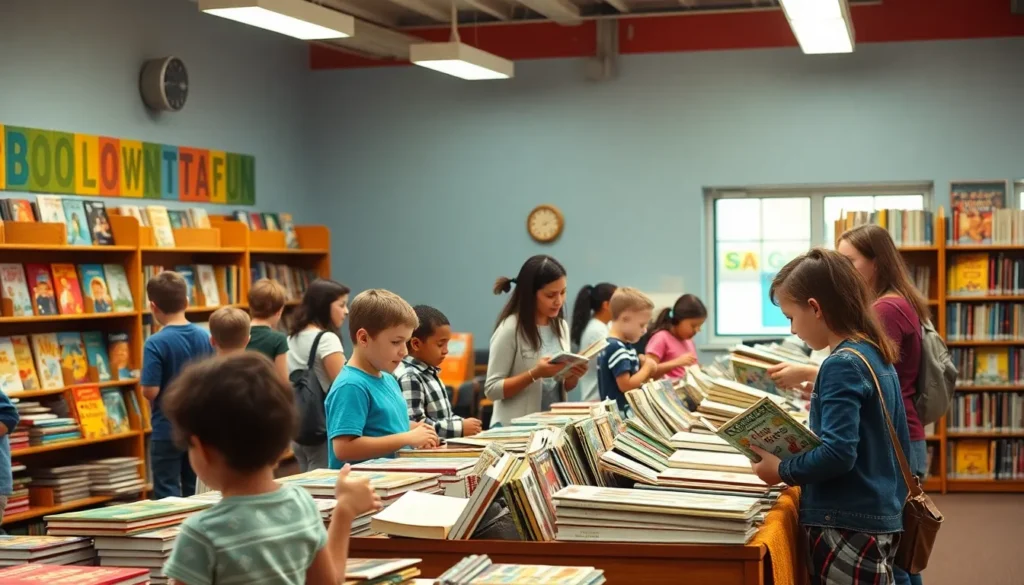Table of Contents
ToggleImagine a world where kids trade their toys for tales, and the only currency is imagination. Welcome to the magical realm of elementary book fairs! These vibrant events transform school hallways into treasure troves of stories waiting to be discovered. From whimsical adventures to spine-tingling mysteries, there’s something for every young reader.
Overview of Elementary Book Fairs
Elementary book fairs transform school environments into vibrant literary hubs. Schools host these engaging events to promote reading among students. Various genres are showcased, ensuring every child’s interests are represented. Titles range from whimsical adventures to thrilling mysteries.
Children actively explore new stories and make selections for their personal libraries. Events typically feature colorful displays and inviting setups that attract young readers. Teachers often participate, guiding students in selecting appropriate books.
Parents are encouraged to attend, fostering a sense of community around literacy. Schools frequently partner with local vendors to provide diverse offerings. Special activities may enhance the experience, such as author visits or storytelling sessions.
Book fairs also serve a fundraising purpose. Schools often use proceeds to add new titles to classroom libraries or to support literacy programs. Additionally, students learn the value of supporting their school while building excitement for reading.
Planning and hosting an elementary book fair involves coordination among staff, parents, and vendors. Success relies on effective promotion, often through newsletters or social media announcements. Engaging themes can also motivate student participation.
Through these events, schools ignite a passion for reading that lasts beyond the classroom. Many students discover a love for books they’ll carry into their future. Elementary book fairs truly celebrate the joy of reading while nurturing a supportive community around literature.
Importance of Book Fairs in Schools

Elementary book fairs play a crucial role in developing reading habits among students, enhancing their literacy journey.
Enhancing Reading Skills
Engagement with a variety of books at fairs sharpens students’ reading skills. Access to different genres encourages children to explore new vocabulary and comprehend diverse writing styles. Opportunities for choosing their own books foster critical thinking, as they analyze their preferences and interests. Interactive environments stimulate discussions among peers, further promoting dialogue around reading. Parents’ involvement provides additional support, reinforcing reading practices at home.
Fostering a Love for Books
Book fairs inspire young readers to discover the joy of reading. They introduce exciting stories and relatable characters that captivate children’s imaginations. Exposure to new authors and series stimulates curiosity and eagerness to learn more. Special activities, such as storytelling sessions, create memorable experiences that deepen enthusiasm for books. Ultimately, these events cultivate a community that celebrates literature, helping children form meaningful connections with reading.
Organizing a Successful Book Fair
Organizing a successful book fair involves careful planning and collaboration. Event coordinators must focus on key areas to create an engaging experience for students.
Selecting the Right Titles
Choosing the right titles significantly impacts student interest. Schools should aim for a diverse range of genres, including fiction, non-fiction, and graphic novels. Engaging with teachers can help identify popular books and emerging authors, tailoring selections to students’ preferences. Surveys may also gather insights from students and parents about desired titles. Ensuring a balance between classic literature and contemporary works keeps the selections fresh and exciting. Including bilingual options accommodates diverse populations, promoting inclusivity within the community.
Marketing the Event
Effective marketing drives attendance and engagement at the book fair. Schools should promote the event through various channels, including newsletters, social media, and school announcements. Creating eye-catching posters and flyers in prominent areas attracts attention. Involving students in marketing efforts, such as making announcements or designing promotional material, enhances ownership of the event. Additionally, sharing the financial goals of the fair can generate support from parents and local businesses. Communicating special activities, such as author visits or workshops, can further entice families to participate. Consistent messaging about the event fosters excitement and helps build a strong community around literacy.
Community Involvement
Community involvement enhances the success of elementary book fairs, fostering a supportive environment for literacy.
Engaging Parents and Volunteers
Parents and volunteers play a crucial role in the preparation and execution of book fairs. They assist with organizing books and setting up displays, contributing their time and passion for reading. Involvement creates opportunities for parents to connect with teachers and staff, strengthening relationships within the community. Regular communication with parents encourages participation and highlights ways they can support the event, such as volunteering for shifts during the fair. Creating a welcoming atmosphere allows families to engage in conversations about books, deepening their children’s interest in reading. Active parent involvement leads to increased attendance, enhancing the overall experience for students and families alike.
Collaborating with Local Libraries
Local libraries provide invaluable resources and support for elementary book fairs. Collaboration with libraries ensures access to diverse book selections, including recent titles and popular series. Librarians can offer expert advice on suitable books and present engaging programs during the fair, enhancing student experience. Moreover, partnerships with libraries promote community awareness of literacy initiatives and programs available. Joint events can be organized, such as author visits or reading sessions, creating memorable experiences for young readers. These alliances not only enrich the book fair but also cultivate long-term relationships between schools and community libraries, ultimately encouraging a lifelong love for reading.
Elementary book fairs are more than just events; they’re vibrant celebrations of literature that spark a love for reading in young minds. By bringing together students, parents, and educators, these fairs create a community focused on literacy, imagination, and exploration. The engaging atmosphere encourages children to dive into new stories and genres while fostering essential reading habits.
With careful planning and collaboration, schools can ensure these events are successful and memorable. The involvement of parents and local vendors further enriches the experience, making it a collective effort to inspire the next generation of readers. Ultimately, elementary book fairs play a crucial role in nurturing a lifelong passion for books and storytelling.


